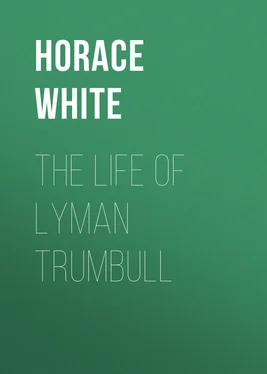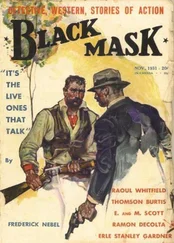Horace White - The Life of Lyman Trumbull
Здесь есть возможность читать онлайн «Horace White - The Life of Lyman Trumbull» — ознакомительный отрывок электронной книги совершенно бесплатно, а после прочтения отрывка купить полную версию. В некоторых случаях можно слушать аудио, скачать через торрент в формате fb2 и присутствует краткое содержание. Жанр: foreign_prose, История, foreign_edu, foreign_antique, на английском языке. Описание произведения, (предисловие) а так же отзывы посетителей доступны на портале библиотеки ЛибКат.
- Название:The Life of Lyman Trumbull
- Автор:
- Жанр:
- Год:неизвестен
- ISBN:нет данных
- Рейтинг книги:5 / 5. Голосов: 1
-
Избранное:Добавить в избранное
- Отзывы:
-
Ваша оценка:
- 100
- 1
- 2
- 3
- 4
- 5
The Life of Lyman Trumbull: краткое содержание, описание и аннотация
Предлагаем к чтению аннотацию, описание, краткое содержание или предисловие (зависит от того, что написал сам автор книги «The Life of Lyman Trumbull»). Если вы не нашли необходимую информацию о книге — напишите в комментариях, мы постараемся отыскать её.
The Life of Lyman Trumbull — читать онлайн ознакомительный отрывок
Ниже представлен текст книги, разбитый по страницам. Система сохранения места последней прочитанной страницы, позволяет с удобством читать онлайн бесплатно книгу «The Life of Lyman Trumbull», без необходимости каждый раз заново искать на чём Вы остановились. Поставьте закладку, и сможете в любой момент перейти на страницу, на которой закончили чтение.
Интервал:
Закладка:
In 1787, Congress passed an ordinance for the government of the territory northwest of the river Ohio which had been ceded to the United States by Virginia. The sixth article of this ordinance prohibited slavery in said territory. Inasmuch as the rights of persons and property had been guaranteed by treaties when this region had passed from France to Great Britain and later to the United States, this article was generally construed as meaning that no more slaves should be introduced, and that all children born after the passage of the ordinance should be free, but that slaves held there prior to 1787 should continue in bondage.
Immigration was mainly from the Southern States. Some of the immigrants brought slaves with them, and the territorial legislature passed an act in 1812 authorizing the relation of master and slave under other names. It declared that it should be lawful for owners of negroes above fifteen years of age to take them before the clerk of the court of common pleas, and if a negro should agree to serve for a specified term of years, the clerk should record him or her as an "indentured servant." If the negro was under the age of fifteen, the owner might hold him without an agreement till the age of thirty-five if male, or thirty-two if female. Children born of negroes owing service by indenture should serve till the age of thirty if male, and till twenty-eight if female. This was a plain violation of the Ordinance of 1787 and was a glaring fraud in other respects. The negroes generally did not understand what they were agreeing to, and in cases where they did not agree the probable alternative was a sale to somebody in an adjoining slave state, so that they really had no choice. The state constitution, adopted in 1818, prohibited slavery, but recognized the indenture system by providing that male children born of indentured servants should be free at the age of twenty-one and females at the age of eighteen. The upshot of the matter was that there was just enough of the virus of slavery left to keep the caldron bubbling there for two generations after 1787, although the Congress of the Confederation supposed that they had then made an end of it.
This arrangement did not satisfy either the incoming slave-owners or those already domiciled there. Persistent attempts were made while the country was still under territorial government, to procure from Congress a repeal of the sixth article of the Ordinance, but they were defeated chiefly by the opposition of John Randolph, of Roanoke, Virginia. After the state was admitted to the Union, the pro-slavery faction renewed their efforts. They insisted that Illinois had all the rights of the other states, and could lawfully introduce slavery by changing the constitution. They proposed, therefore, to call a new convention for this purpose. To do so would require a two-thirds vote of both branches of the legislature, and a majority vote of the people at the next regular election. A bill for this purpose was passed in the Senate by the requisite majority, but it lacked one vote in the House. To obtain this vote a member who had been elected and confirmed in his seat after a contest, and had occupied it for ten weeks, was unseated, and the contestant previously rejected was put in his place and gave the necessary vote. Reynolds, who was himself a convention man, says that "this outrage was a death-blow to the convention." He continues:
The convention question gave rise to two years of the most furious and boisterous excitement that ever was visited on Illinois. Men, women, and children entered the arena of party warfare and strife, and families and neighborhoods were so divided and furious and bitter against one another that it seemed a regular civil war might be the result. Many personal combats were indulged in on the question, and the whole country seemed to be, at times, ready and willing to resort to physical force to decide the contest. All the means known to man to convey ideas to one another were resorted to and practiced with energy. The press teemed with publications on the subject. The stump orators were invoked, and the pulpit thundered with anathemas against the introduction of slavery. The religious community coupled freedom and Christianity together, which was one of the most powerful levers used in the contest.
At this time all the frontier communities were anxious to gain additions to their population. Immigration was eagerly sought. The arrivals were mostly from the Southern States, the main channels of communication being the converging rivers Ohio, Mississippi, Cumberland, and Tennessee. Many of these brought slaves, and since there was no security for such property in Illinois, they went onward to Missouri. One of the strongest arguments used by the convention party was, that if slavery were permitted, this tide of immigration would pour a stream of wealth into Illinois.
Most of the political leaders and office-holders were convention men, but there were some notable exceptions, among whom were Edward Coles, governor of the state, and Daniel P. Cook, Representative in Congress, the former a native of Virginia, and the latter of Kentucky. Governor Coles was one of the Virginia abolitionists of early days, who had emancipated his own slaves and given them lands on which to earn their living. The governor gave the entire salary of his term of office ($4000) for the expenses of the anti-convention contest, and his unceasing personal efforts as a speaker and organizer. Mr. Cook was a brilliant lawyer and orator, and the sole Representative of Illinois in Congress, where he was chairman of the Committee on Ways and Means, and where he cast the vote of Illinois for J. Q. Adams for President in 1824. Cook County, which contains the city of Chicago, takes its name from him. He was indefatigable on the side of freedom in this campaign. Another powerful reinforcement was found in the person of Rev. John M. Peck, a Baptist preacher who went through the state like John the Baptist crying in the wilderness. He made impassioned speeches, formed anti-slavery societies, distributed tracts, raised money, held prayer-meetings, addressed Sunday Schools, and organized the religious sentiment of the state for freedom. He was ably seconded by Hooper Warren, editor of the Edwardsville Spectator . The election took place August 2, 1824, and the vote was 4972 for the convention, and 6640 against it. In the counties of St. Clair and Randolph, which embraced the bulk of the French population, the vote was almost equally divided—765 for; 790 against.
In 1850, both Henry Clay and Daniel Webster contended that Nature had interposed a law stronger than any law of Congress against the introduction of slavery into the territory north of Texas which we had lately acquired from Mexico. From the foregoing facts, however, it is clear that no law of Nature prevented Illinois from becoming a slaveholding state, but only the fiercest kind of political fighting and internal resistance. John Reynolds (and there was no better judge) said in 1854: "I never had any doubt that slavery would now exist in Illinois if it had not been prevented by the famous Ordinance" of 1787. The law of human greed would have overcome every other law, including that of Congress, but for the magnificent work of Edward Coles, Daniel P. Cook, John Mason Peck, Hooper Warren, and their coadjutors in 1824.
The snake was scotched, not killed, by this election. There were no more attempts to legalize slavery by political agency, but persevering efforts were made to perpetuate it by judicial decisions resting upon old French law and the Territorial Indenture Act of 1812. Frequent law suits were brought by negroes, who claimed the right of freedom on the ground that their period of indenture had expired, or that they had never signed an indenture, or that they had been born free, or that their masters had brought them into Illinois after the state constitution, which prohibited slavery, had been adopted. In this litigation Trumbull was frequently engaged on the side of the colored people.
Читать дальшеИнтервал:
Закладка:
Похожие книги на «The Life of Lyman Trumbull»
Представляем Вашему вниманию похожие книги на «The Life of Lyman Trumbull» списком для выбора. Мы отобрали схожую по названию и смыслу литературу в надежде предоставить читателям больше вариантов отыскать новые, интересные, ещё непрочитанные произведения.
Обсуждение, отзывы о книге «The Life of Lyman Trumbull» и просто собственные мнения читателей. Оставьте ваши комментарии, напишите, что Вы думаете о произведении, его смысле или главных героях. Укажите что конкретно понравилось, а что нет, и почему Вы так считаете.












